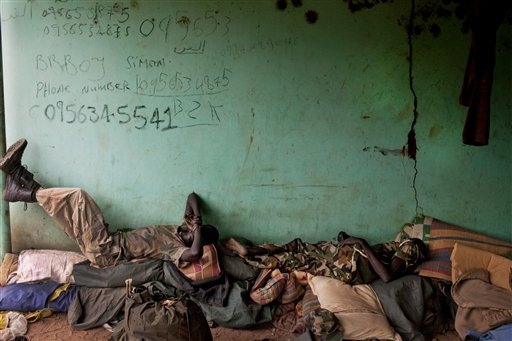
UNITED NATIONS (AP) — Sudan's refusal to arrest President Omar al-Bashir and three others accused of war crimes in Darfur is "a direct challenge" to the U.N. Security Council, and it should now consider asking all countries and regional organizations to carry out the arrests, the International Criminal Court's chief prosecutor said Tuesday.
Luis Moreno-Ocampo conceded that council discussions of other possibilities to arrest the four Sudanese, including seeking help from member states and regional bodies, "will be problematic" since there is no consensus among the 15 members on how to deal with the problem.
"But the victims will receive a clear message: They are not ignored," he said. "And the perpetrators will receive a clear message: There will be no impunity."
The court, set up in 2002 to prosecute the most senior perpetrators of genocide, crimes against humanity and war crimes from nations that cannot or will not put them on trial, has no police force of its own to arrest suspects. The 121 countries that are parties to the Rome statute that established the court are required to arrest those sought by the tribunal — but al-Bashir has traveled to friendly nations without being detained and countries that have not signed on to the court are not required to make arrests.
Darfur was plunged into turmoil in 2003, when ethnic African rebels took up arms against the Arab-dominated Sudanese government, whom they accused of discrimination. The Khartoum government is accused of retaliating by unleashing Arab militias on civilians — a charge the government denies. The U.N. estimates 300,000 people have died and 2.7 million have been displaced in the conflict.
The Security Council authorized the court to investigate atrocities in Darfur in 2005, and it has issued an arrest warrant for the Sudanese president for allegedly orchestrating genocide, crimes against humanity and war crimes in Darfur. South Kordofan Gov. Ahmed Harun, militia leader Ali Kushayb and Defense Minister Abdelrahim Mohamed Hussein are accused of war crimes and crimes against humanity.
Sudan's U.N. Ambassador Daffa-Alla Elhag Ali Osman condemned and denounced "in the strongest terms" Moreno-Ocampo's call for the Security Council to consider other proposals to carry out the arrests. He accused the prosecutor of trying to incite the council against Sudan when it is trying to restore peace to Darfur, and he argued that the International Criminal Court has no jurisdiction in the vast region.
While Sudan is not a party to the Rome statute that established the tribunal, Moreno-Ocampo has jurisdiction in Darfur because the Security Council asked him to investigate atrocities there.
Moreno-Ocampo, whose nine-year term as prosecutor ends next week, expressed great frustration at Sudan's refusal to arrest the four men indicted by the court.
"My proposal to the council was, think in new ways to implement the arrest warrants because ... until now we're failing," he told reporters afterward.
Moreno-Ocampo said the council could authorize countries to arrest the four inside or outside Sudan — and it could seek help from the African Union, the main regional organization, which is "very relevant to the conflict in Darfur."
Richard Dicker, international justice director at Human Rights Watch, said "Khartoum has obstructed justice for horrific crimes in Darfur for years, in part protected by China," which has major investments in Sudan and is a permanent veto-wielding member of the Security Council. He called for an end to this "double standard" for justice.
"In a more practical way," Dicker said, "al-Bashir could be arrested on a presidential visit outside of Sudan by any state. This requires no additional Security Council approval," just a decision by the country even if it isn't a party to the Rome statute.
In his briefing to the council, Moreno-Ocampo noted that at a previous briefing the Sudanese ambassador challenged the evidence against the accused. He said his office is prepared to discuss the evidence "in the courtroom before the judges."
He later warned Osman that under a provision of the Rome statute his denial of crimes in Darfur "could be considered part of the crimes" and his office would investigate whether the ambassador's intention was "to further the criminal purpose of a group of perpetrators."
"I think there's a limit on what an ambassador can do and cannot do," Moreno-Ocampo said. "An ambassador cannot follow illegal orders."
The prosecutor pointed to Libya's two U.N. ambassadors who broke with Moammar Gadhafi after shootings in Benghazi and Tripoli at the start of last year's protest rather than defend his regime.
Osman accused Moreno-Ocampo of being in "an emotional state," lacking credibility and attempting "intimidation and terrorization." He said he would reflect on what action to take regarding "this threat and this kind of terrorism to which I have been subjected by the prosecutor..."